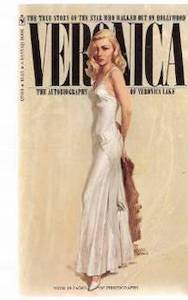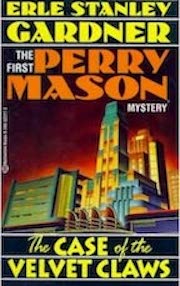- Messages
- 16,872
- Location
- New York City

Veronica: The Autobiography of Veronica Lake (with Donald Bain) published in 1969
Eddie Muller, the host of TCM's outstanding "Noir Alley," turned me onto this one, in part, because he mentioned that he wrote the introduction. Well, I'm a fan of Muller, but I expected more than a brief two-and-a-half pages from him. However, what he wrote was good and the book is an entertaining enough fast read.
Autobiographies are what they are - a person writing his or her own history. Even an honest attempt at the truth would suffer from memory lapses and unintentional bias, but how many write an honest autobiography?
Based on my general knowledge of Ms. Lake's life, which includes a biography of it read many years ago, Ms. Lake wasn't shooting for total honesty in this one. But what the heck, it's a book by a huge Golden Era star that has some fun inside-Hollywood tales and adds something to the Veronica Lake story.
After her not-great-not-horrible upbringing, including the early loss of a father, but a very good relationship with her ensuing stepfather and a mixed one with her driven mother, Lake came with her family to Hollywood at sixteen years old.
In a case of almost instant stardom, less than two years after her first role as an extra, Lake was a major star. First, in a wonderful happenstance during a promotional shoot, an airplane's propeller wash wrapped her skirt tightly around her, creating a perfect and very popular cheesecake publicity photo (see below) for her first real movie, I Wanted Wings. Then, with all but no experience, she improbably got the starring role in her next movie, the smartly funny and socially conscience Sullivan's Travels, and it was a hit.
Veronica Lake movie star and sex goddess was launched. And, for the next few years, several hits followed propelling her and her peek-a-boo hairstyle to mega stardom. But throughout it, Lake, by her own admission, was often difficult to work with. While she claims it was to cover for her insecurities, even with her spin, you're still thinking stardom might also have gone to her head, at least somewhat.
Add into that time period her first of four marriages, the birth of her first child, the death of her stepfather and a break with her mother and a lot of chaotic life was squeezed into a narrow window. Also lightly touched on was too much drinking and way too much spending.
But there were also some wonderful Golden Age of Hollywood moments as when lothario Errol Flynn takes her rejection of his suggestion for a roll in the hay in stride, which led to a nice platonic friendship between the two. Even better was the description of a quixotic night-long bender Lake had with Gary Cooper where the two enjoyably spent the evening (deep into the morning) hopping from one tawdry strip club to another critiquing the women "performers" as they went.
Lake characterizes all her issues - the spending, the fighting with the studios, her difficult reputation - as part of her rebellious nature, but that makes one wonder what exactly was she was rebelling against other than adulthood. Sure, studios weren't fair and some family and friends tried to use her, but that's also called life. Stars like Bette Davis and Joan Crawford fought their way through the same issues to forge decades-long careers.
Unfortunately, Lake's anger and personal life - including a divorce and second rocky marriage - worked against a long career so that less than ten-years later, by the end of the forties, her time in movies was all but over just when her spendthrift ways had pretty much drained her bank account.
From there, Lake spent the fifties into the sixties milking some good money out of her fading stardom via TV and summer-stock work, but usually spending more than she made, so that any slowdown in income quickly became a crisis. This time also saw periods of alcoholism, the failure of marriages number two and three and inconsistent parenting of her, now, three children.
To her credit, Lake doesn't gloss over or excuse all of her self-inflicted problems, but when you think through her explanations, you see many gaps that don't reflect favorably on the star. And what most jumps out at you is that she seemed only to learn very, very slowly from her mistakes.
To wit, even in the late fifties, after having been up and down financially several times and after a publicly embarrassing exposure when she was bartending in a run-down hotel in return for a room, she immediately took an expensive apartment when she caught a good job in radio for a few months. You almost want to scream at the book, "save some money, you should know better by now." But that was not what Lake, the self-described "rebel," would do (until later in life).
In the end, we're left with a woman with many personal shortcomings that hurt her more than anyone else (except, maybe, her children). Despite all that, I still love Veronica Lake the movie star. This Gun for Hire was a picture I first saw in my teens where Lake and her famously flowing blonde locks hooked me for life.
I wanted to read that her life turned out well and I wanted to blame her problems on others, but even with her spin, you come away from her autobiography mainly disappointed because she seems like a reasonably decent person who was also her own worst enemy. However, at least by the late sixties, it appears she had settled down into an okay life with the self-destructive extremes and excesses kinda sorta behind her. Who knows what's true and what's Lake-spin in Veronica, but still, the book is a fun enough quick swim through a notable rivulet of Golden Era Hollywood.
The career-boosting promo picture from I Wanted Wings
And the famous peekaboo hairstyle
